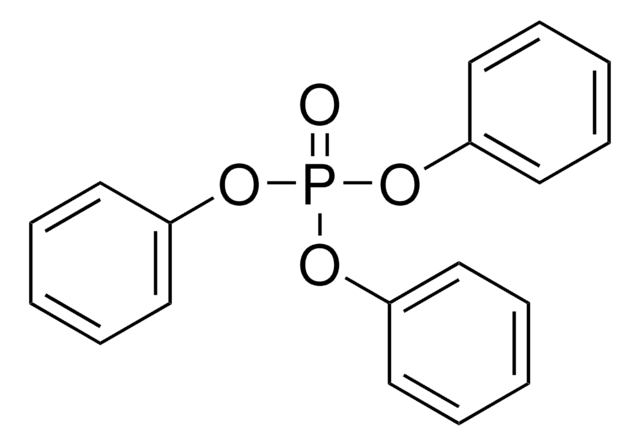CRM67618
Trichlorfon
certified reference material, TraceCERT®, Manufactured by: Sigma-Aldrich Production GmbH, Switzerland
Synonym(s):
(2,2,2-Trichloro-1-hydroxyethyl)phosphonic acid dimethyl ester, Metrifonate
About This Item
Recommended Products
grade
certified reference material
TraceCERT®
Quality Level
product line
TraceCERT®
shelf life
limited shelf life, expiry date on the label
manufacturer/tradename
Manufactured by: Sigma-Aldrich Production GmbH, Switzerland
format
neat
storage temp.
−20°C
SMILES string
COP(=O)(OC)C(O)C(Cl)(Cl)Cl
InChI
1S/C4H8Cl3O4P/c1-10-12(9,11-2)3(8)4(5,6)7/h3,8H,1-2H3
InChI key
NFACJZMKEDPNKN-UHFFFAOYSA-N
Looking for similar products? Visit Product Comparison Guide
General description
Certified content by quantitative NMR incl. uncertainty and expiry date are given on the certificate.
Download your certificate at: http://www.sigma-aldrich.com
Trichlorfon is a broad-spectrum organophosphate insecticide used for the protection of a variety of fields and fruit crops. It is also used against fish parasites in aquaculture. It inhibits the activity of acetylcholinesterase (AChE) and causes the acetylcholine (ACh) to accumulate in the nerve synapses thereby disrupting nerve function.
Trichlorfon is not approved for use in the European Union (EU) as a plant protection agent under Regulation (EC) No. 1107/2009, repealing directive 91/414/EEC. But a default maximum residue limit (MRL) of 0.01 mg/kg and 0.02 mg/kg is set for its presence in fresh/frozen fruits and tree nuts respectively as per the Reg. (EU) No 899/2012.
Application
The trichlorfon CRM may also find the following uses:
- Determination of trichlorfon in leek and cucumber samples by direct competitive biomimetic immunosorbent assay based on the use of a molecularly imprinted polymer
- Development of a biomimetic immunoassay-capillary electrophoresis (BI-CE) method using quantum dot (QD) labels to determine trichlorfon in carrot, zucchini, edible rape, and leek samples
- Analysis of phthalates and 18 insecticide residues in 46 different samples of shrimps using liquid/gas chromatography-tandem mass spectrometry (LC/GC-MS/MS) for the risk assessment of compounds on human health
- Multi-residue determination of 238 pesticides and 78 veterinary drugs in 80 bovine milk samples by ultra-fast liquid chromatography-tandem mass spectrometry (UFLC-MS/MS) and gas chromatography-tandem mass spectrometry (GC-MS/MS)
- Evaluation of nanoflow liquid chromatography-mass spectrometry (LC-MS) to simultaneously determine 60 pesticide residues from different chemical classes in tomato, baby food, olive oil, orange, and fruit jam samples
- Validation of a liquid chromatography-tandem mass spectrometry (LC-MS/MS) method for detection and quantification of clanobutin, dichlorvos, and naftazone in pork, beef, chicken, milk, and egg samples
Recommended products
Legal Information
signalword
Danger
Hazard Classifications
Acute Tox. 4 Dermal - Acute Tox. 4 Oral - Aquatic Acute 1 - Aquatic Chronic 1 - Resp. Sens. 1 - Skin Sens. 1
Storage Class
11 - Combustible Solids
wgk_germany
WGK 3
flash_point_f
Not applicable
flash_point_c
Not applicable
Choose from one of the most recent versions:
Certificates of Analysis (COA)
Don't see the Right Version?
If you require a particular version, you can look up a specific certificate by the Lot or Batch number.
Already Own This Product?
Find documentation for the products that you have recently purchased in the Document Library.
Chromatograms
application for LC-MS, application for SPEOur team of scientists has experience in all areas of research including Life Science, Material Science, Chemical Synthesis, Chromatography, Analytical and many others.
Contact Technical Service








